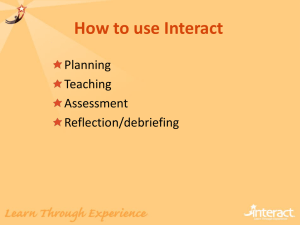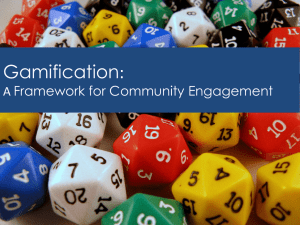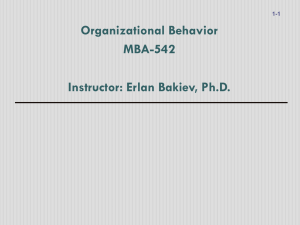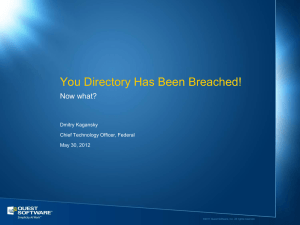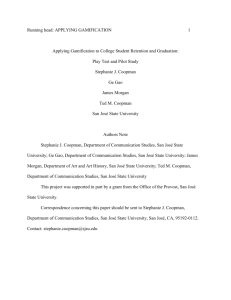ppt - 2012
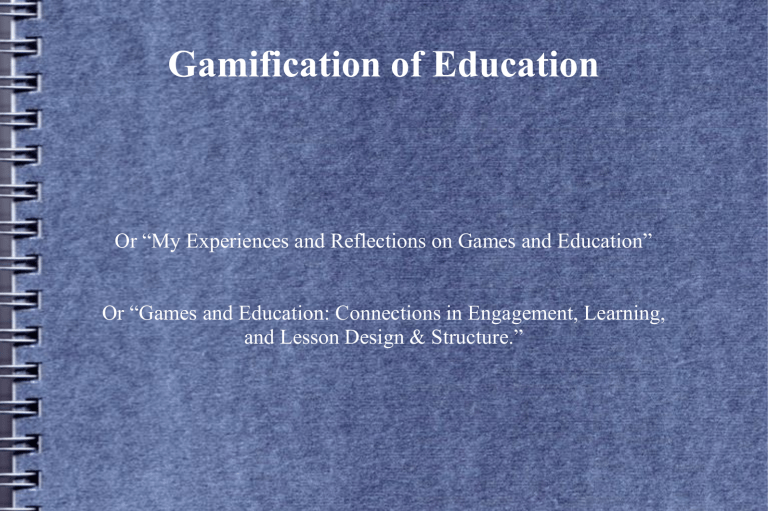
Gamification of Education
Or “My Experiences and Reflections on Games and Education”
Or “Games and Education: Connections in Engagement, Learning, and Lesson Design & Structure.”
Introductions
Masters degree at The Ohio State University 2012
Game
Volunteer design and demo work
Tutor since 2001
Brookwood Academy Math Teacher
How I got here in the first place
Definition of a Game
Jane McGonigal, author of
Reality is Broken: Why Games Make Us Better and How
They Can Change the World
“Games are unnecessary obstacles we volunteer to tackle.”
Assumption: Games are a good vehicle for education
Question: How do we satisfy the definition for math ed.?
Game researcher specializing in pervasive gaming and Alternate Reality Games
(ARGs). 'The face of Gamification'
What is Gamification?
The use of game mechanics and game design in non-game constructs .
(Wikipedia)
Gamification of...
Shopping
Government
Fund Raising
Health
Not New, but New Twists
Punch Card at Coffee Shop
Karate Belts
Aging
Money
Dieting
Daily Chores
>>> http://www.chorewars.com
Gamification Definition Revisited
“A careful and considered application of game thinking to solving problems and encouraging learning using all the elements of games that are appropriate”
(Karl M Kapp “The Gamification of Learning and Instruction”)
Problems?
Elements of games?
What is appropriate?
Game thinking?
Karl M Kapp is a Doctorate of Education in Instructional Design at U. Pittsburg and a professor of Instructional Technology at Bloomsburg U.
Focus on E-Learning and adult education and corporate instruction.
Game Thinking
Thinking about a concept and converting it into an activity that has elements of competition, cooperation, exploration and storytelling
.
-Kim, A.J. (2011, March 23). Gamification 101: Designing the player journey. Google Tech Talk, www.youtu.be/B0H3ASbnZmc
Amy Jo
Kim has a PhD in Behavorial Nueroscience and works internationally with social game design and community architecture (Rock
Band, The Sims, Ultima Online, Netflix, eBay...).
This is not the solution to everything!!!
Gartner is an information technology research and advisory firm
Types of Gamers
Richard Bartle's gamer break down based on computer game surveys
Explorers, Socializers, Killers, Achievers.
Online test rates you based on MMORPG context
I'm 73% Explorer, 53% Socializer, 47% Killer, 27% Acheivert
http://www.gamerdna.com/quizzes/bartle-test-of-gamer-psychology
Richard Bartle was the co-creator of the first MUD and is now a professor in game design.
More Gamer Type Models
Jon Radoff has his own system to identify gamers that seems a bit more for
ALL types of game players, but whose words are not nearly as catchy...
Jon Radoff created the first
MMORPG commercially offered, called “Legends of Future Past” in
1992 when he was 20.
Welcoming Games for All Players
Monopoly
Explorer: Community Chest / Chance
Killer: Never trading, selective buying to ruin someone else's game
Socializer: Making deals, sharing success and failure with players
Achievers: Winning big or fast.
Win Win mechanic
Tedious End Game
Long Game Play
Lack of Customization / Initial Choice
A 'Classic' Game Analyzed
Dungeon and Dragons
Explorers: Only limited by the imagination of the Game Master
Killers: Often players can fight against one another in certain adventures and sessions. If not, its Players vs. Game Master
Socializers: Cooperation in your group to defeat obstacles
Acheivers: Getting more gold, min maxing your character, leveling
Long Game Play
Possible Slow Game Play
Another Game 'Analysis'
Jeopardy
Explorer: Picking the weird topic?
Killer: ...
Socializer: Chatting with the players?
Achievers: Positing the Answers
Win Win mechanic
Prerequisite knowledge
Lack of player interaction
Unit Analysis
Explorers: Students like to find out new things and try things new ways.
Open ended questions, inquiry based learning. Choice.
Killers: Students like competition, not always against one another, but against a class, a clock or the teacher.
Socializers: Group work, Think Pair Share, presentations.
Achievers: Well defined rubric, specific definitions, clear objectives, final test.
What else can we learn from Games?
What Makes (some) Games Good?
Theme
Sound Track
Intuitive Game Play
Progressive Difficulty
Selectable Difficulty
Failure means Try Again!
Continuous Feed Back
Choices
(multiple) Point System
Education Specific Concepts
Theme: Recycling Theme for a Year at Metro
School
Sound Track: Mozart... Good Acoustics...?
Intuitive Game Play: Activating Prior Learning /
Background Knowledge
Progressive Difficulty: Scaffolding
Selective Difficulty: Differentiation
Education Specific Concept Cont...
Failure means Try Again! : … Infinite Retakes?
Late Work? … OGT problem
Continuous Feed Back: Delay in feedback often occurs...
Choices: Different roles in some group work but...
(multiple) Point Systems: Grade and perhaps a classroom management system
On Flow and Fiero
Fiero is the pride felt after personal triumph over adversity
Mihály Csíkszentmihályi positve psychologist
Isabella Poggi, psychologist
Reflection
Set – Up
Third 3 month placement at OSU STEM Masters program
Hilliard Middle School: 8 th grade and 7 th grade Pre-Algebra
Three weeks before placement begins
Classroom Management Plan
Quest Creation
Leveling System
Reward System
Inspired by Quest to Learn www.chicagoquest.org
Gamified Schools
Quest to Learn : New York, Chicago
Domains:
Being Space Place
CodeWorlds
The Way Things Work
Wellness
Sports of the Mind
(ELA and Social Studies)
(math and writing)
(math and science)
(social emotional physical)
(digital and media arts)
Grade Levels: “novice” “apprentice” “expert”
Boss Battles
Rube Goldberg Machine
3-D Model of New York
Gamified Courses
Lee Sheldon's “Multiplayer Classroom: Designing
Coursework as a Game”
Welcome to my class. Right now, you all have an 'F'
Points based assessment
Choices and Paths
Cooperative and Competitive
Several other teachers share their own personal classrooms in the book and a few on his facebook page.
My Classroom Management
Houses
Choice
House Roles
Herald
Differentiation
Porter
Camaraderie
Census Scribe
Rewards
House Points
Six Cooperatively defined categories reward or detract House Points
Leadership Economy Advancement Family Culture Belief
Rewards:
House Points win House Cup (cookie / cupcake party)
Quest System
Each House had an Elemental Aspect
Earth Fire Air
A few times a week new Quests would be available.
Players were given a choice between two or more Quest Givers
Quests would detail the Theme, Rewards, and Requirements
A strange spherical robot person greets you in the hallway and wants to give you some M.B.s later in the day and says “Zero Zero. 30 degrees from 4 to 1”
What could it mean? Lets research about angles, maybe we'll figure it out...
Aspects
Aspects of a House would be the first requirement of a Quest for those
Players
Players gain XP and M.B.s for completing that Aspect of the Quest
Wind Aspect “Research what kind of thing 30 degrees is. On a clock, how could we have 30 degrees from 4 to 1? What if you have to leave early and want to leave it a note to meet YOU at a certain time?”
Players can gain more XP by completing additional Aspects of the Quest
Rewards
Players were given a Leveling Chart and a Character Sheet to record progress
Levels provided a few M.B.s on obtaining, but were primarily intended to serve as their grade for different topics like “Geometry 2-D” or “Probability”
Level 1-9 'Needs more Work' Level 10 – D Level 11 – D+ ….
M.B.s provided as an economy for buying school supplies, extra hall passes, candy or other such prizes.
Player leader boards were also planned as well as titles.
Choice
Students could spend M.B.s on selecting a new Quest
.
Crafting
Build a Quest
Exploration Report
Mathemagical Mistake Monster
Battles
Mandatory Activities
Quizzes
OGT Preparation
Project Pandora
Triangle Duel
Triangle Duel
Houses were provided the same triangles on harder stock paper of various types: Isosceles, Equilateral, etc... 2 of each (or so).
I would randomly choose two triangle types
Houses were given two minutes to trace their triangles, connected if they wish, such that it would be difficult for the next House to match their triangles onto another House's tracing
Houses were given two minutes to match their triangles with the tracing.
Sort of a 'make your own tangram'.
Students were given House points and sometimes XP.
Project Pandora
Students were handed or provided three dimensional objects
Given context that their amicable and successful analysis and sharing their ideas of surface area and volume of the five primary geoshapes would lock
Pandora's box again. Had a score board which I would use for classroom management and insightful discovery. Warned not to let it increase.
Explorer: Different ways of finding formula. What makes the score move?
Killer: Outperforming other 'Houses' (classroom management), End Game.
Socializer: Group work and presentations.
Achiever: Getting the right equations and doing good work!
Encountering Pandora's Beast: Students were to use created compound
Geoshapes to do battle (rolling dice) to damage the remaining score total.
Good and Bad / Unexpected
Slight discipline improvements
Change in assignment interest and completion rate
Mathemagical Mistake Monsters
Tracking and use of Math Bucks
Too much time / too many changes
Review was not rewarded / accomplished
Present and Future Considerations
Games Club in school
Game Design request from participants: analysis and implementation
Some in-class games play
House / class points
Review time journal writing / random monster encounter
Online interface with Chorewars
Mixed 'ability' Houses
Use of Games in School
Use as Content Focus
“The Math of Yahtzee!”
Use as Content Delivery System
Review Games
“Jeopardy”
Use as a Classroom Management
Distraction
“Heads up 7-Up”
Integrate all in Meaningful Appropriate Engaging Manner as Curriculum
I and Others Aspire Towards!
Books I Like
Jane McGonigal “Reality is Broken...”
Lee Sheldon “The Multiplayer Classroom: Designing
Coursework as a Game”
Karl M Kapp “The Gamification of Learning and
Instruction...”
Raph Koster and Will Wright “Theory of Fun for Game
Design”
Keith Devlins “Mathematics Education for a New Era:
Video Games as a Medium for Learning”

